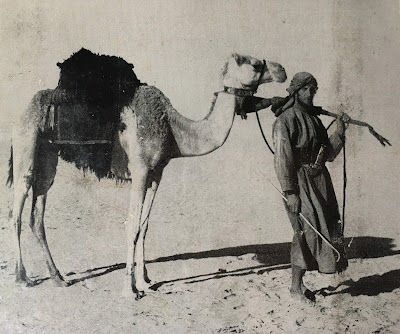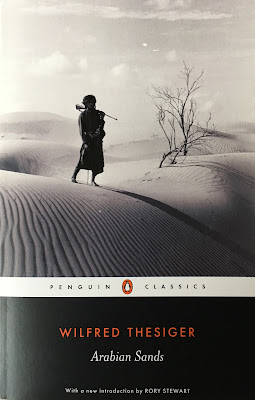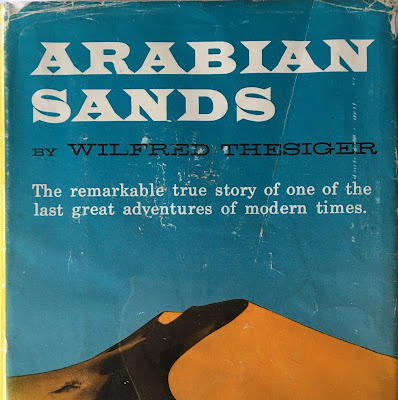Arabian Sands Revisited
In my sophomore year in high school, I had to research and write a history report on Thomas Edward Lawrence, a.k.a. Lawrence of Arabia. I’m embarrassed to admit this, but I developed a mad schoolgirl crush on him. I thought he was dashing, charismatic, and looked cool and chic in long robes. In my adolescent insanity, I would stare at his picture and have imaginary conversations with him.
Thankfully, I outgrew this. (Although I still think long robes are cool and chic. Sometimes I wish we could all wear long robes like they do in the Star Wars movies.) However, through my short-lived infatuation with Lawrence of Arabia, I did develop a fascination with the Arabian desert.
A large portion of my childhood and teen years were spent in Erie, Pennsylvania, one of a series of waterfront cities on Lake Erie including Cleveland and Buffalo. Derisively called the Rust Belt, this area is industrial, predominantly working class, depressing. Erie has the nickname Dreary Erie, and both Erie and Cleveland are referred to as “the mistake on the lake” by many of their residents. The winters are long and miserable. Months of monochrome monotony: the sky almost perpetually grey, leafless skeletal trees, layer upon layer of snow piled up, partially melting and refreezing into a dirty, dog-pee stained mess.
The landscape of Arabia—the blazing, cloudless blue and the searingly hot ocean of undulating sand dunes, some as high as 800 feet—was as foreign to me as an alien planet and I escaped into that world like some people will lose themselves in science fiction or fantasy novels.
My all-time favorite book in high school was Arabian Sands by Wilfred Thesiger. (U.S. first edition published by E. P. Dutton and Company, Inc. New York, 1959.)
 |
| Wilfred Thesiger with his camel |
Thesiger was born in 1910, the son of a British Minister in Ethiopia, and educated at Eton and Oxford. He despised the comfortable hypocrisy of western civilization and the organized rigidity of man-made structures: cities laid out in predictable, straight-line grids; the exacting demands of train schedules; the phony formalities of society, exchanging cards and buttering up social prospects. And most of all, sitting at a desk in an office, a slave to a schedule and paperwork. And early on, he saw ahead to the problem of globalization: “All my life I had hated machines. I could remember how bitterly at school I had resented reading the news that someone had flown across the Atlantic or traveled through the Sahara in a car. I had realized even then that the speed and ease of mechanical transport must rob the world of all diversity.”
Thesiger questioned modernity and technological progress, and I suppose unconsciously I did too, living in the rotting, polluted remains of the Industrial Revolution on one of the most notoriously polluted Great Lakes.
There’s the romantic, Hollywood vision of progress: “We can live on the moon and send people to Mars!” And the day-to-day ugly reality. As far as I can tell, the practical end result of progress is to be transported in our driverless cars via GPS to big box stores or fast-food chains so that we can waddle in for a purchase with our fat bottoms which are becoming ever more ample with ever-increasing time spent sitting and staring at a screen for work, entertainment, or social media scrolling. Obesity, type 2 diabetes, heart disease, and erratic mental health: these are the grotesque fruits of all of our so-called “progress”.
In Thesiger's time, modern western civilization had encroached on Arabia due to the world wars and oil exploration, but there were still vast unexplored regions. Thesiger received backing from the Middle East Ant-Locust Unit to travel through some of these regions to collect information on locust movements and possible breeding grounds. Thesiger had no real interest in locusts, but they had provided the opportunity to travel in areas that, at the time, were shut off to westerners, and which he was eager to explore: “I have seen some of the most magnificent scenery in the world… None of these places has moved me as did the deserts of Arabia.”
Later in life, I sailed through the Suez Canal and the Red Sea on a ship, and indeed, it was unlike any place I’d been to, and I’ve traveled all over the world. The stark emptiness of the desert landscape was hypnotic and there was a palpable sense of timeless mystery.
In Thesiger’s words in Arabian Sands:
“Damascus and Aleppo had been old before Rome was founded. Among the towns and villages, invasion after invasion had heaped ruin upon the ruin, and each new conquest had imposed new conquerors upon the last. But the desert had always been inviolate. There I lived among tribes who claimed descent from Ishmael, and listened to old men who spoke of events which had occurred a thousand years ago as if they had happened in their own youth. I went there with a belief in my own racial superiority, but in their tents I felt like an uncouth, inarticulate barbarian, an intruder from a shoddy and materialistic world.”
“For this was the real desert where differences of race and colour, of wealth and social standing, are almost meaningless; where coverings of pretence are stripped away and basic truths emerge.”
“In the desert I had found a freedom unattainable in civilization; a life unhampered by possessions, since everything that was not a necessity was an encumbrance. I had found, too, a comradeship inherent in the circumstances, and the belief that tranquillity was to be found there. I had learnt the satisfaction which comes from hardship and the pleasure which springs from abstinence: the contentment of a full belly; the richness of meat; the taste of clean water; the ecstasy of surrender when the craving for sleep becomes a torment; the warmth of a fire in the chill of dawn.”
“[In the desert] Time and space were one. Round us was a silence in which only the winds played, and a cleanness which was infinitely remote from the world of men.”
On a side note, in my rereading of Arabian Sands, I remembered that both Moses and Paul the Apostle spent time in Arabia.
Moses had lived a pampered life as a prince in Egypt in a lush court along the Nile River. After he killed an Egyptian who was abusing a Jewish slave, he fled to Midian in Arabia. Interestingly, he remained there for forty years, the same length of time as the Exodus journey, providing much-needed acclimation and maturing to fulfill his unique leadership role.
Before Paul became an apostle, he was the Pharisee Saul of Tarsus. After his conversion, he spent time in Arabia (which in that time extended beyond what we now consider Arabia.) What exactly he did there is not clear, but no doubt he was impacted by the desert and its people. Paul, self-described as "a Pharisee, a son of Pharisees,” had a high measure of respectability and self-righteousness which needed to be stripped off. He later endured severe difficulties in his missionary journeys and I believe his time in Arabia helped acclimate him to the rigors and extremes of his missionary life.
There are years that are unaccounted for in the life of Jesus. Some claim he went to India, but if he did in fact travel abroad, I’d put my money on Arabia.
This was, of course, a pre-Muslim Arabia, but the nomadic camel-breeding tribes of the Arabian desert have been there since the dawn of history. The desert guides and companions of Thesiger were such Arabs, which he was careful to distinguish from the Arabs who cultivate farms or live in towns and cities. These desert Arabs, which he called Bedu (more commonly known as Bedouin), had lived unchanged since ancient, biblical times and were considered “primitive” but had a refinement that “civilized” people didn’t have.
In the desert, there is more at reach a closeness to God difficult to achieve in the comfortable, distraction-addled life of the towns and cities. And the harshness of desert life will purge one of nearly everything that one takes for granted in civilized life. The traits most admired by these desert Arabs are long-suffering endurance and patience.
What a contrast to our lives dominated by the pleasure principle, where it is not unusual to see adults throw tantrums when they do not get their way. Where it is the norm to lead waste-ridden, self-centered lives surrounded by endless toys, knick-knacks, and gadgets that we thoughtlessly discard the second they bore us. In modern life, so much of what steals our attention and faith is detritus and pointless distraction, and we will export and import this detritus and distraction to and from the ends of the world. And we demand even more. Restless, we hop in our cars or planes and rush anywhere that promises amusement and novel experiences.
So much of modern, first-world academia paints life before modernity as undignified and barbaric, but a strong argument could be made the reverse is true.
Our crass, infantile sense of entitlement for instant gratification, convenience, and entertainment generally rules the day. “I want what I want, and I want it now!” I always laugh at the people who think more technology and/or more man-made laws are ultimately going to solve problems like climate change when it is this restlessness, dissatisfaction, and rot in our souls that’s the root problem.
 |
| Cover of Arabian Sands, U.S. First Edition, Dutton, 1959 |
 |
| Penguin Classics Edition (Sadly, it contains only a fraction of the photos and maps in the first edition) |
(Posted 12/12/22)
